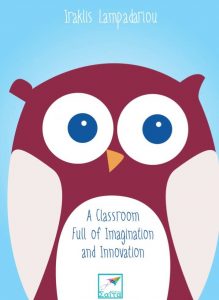 For teachers everywhere, – an innovative teaching guide, which will help you inspire students and foster a love of learning. If you’ve just started out teaching, or you’ve been teaching for a while, but feel there’s something missing, this is a perfect workbook to inspire creativity in innovative learning methods. The book might also be enjoyable for school students who have the opportunity to contribute ideas to the faculty via open forums or school councils.
For teachers everywhere, – an innovative teaching guide, which will help you inspire students and foster a love of learning. If you’ve just started out teaching, or you’ve been teaching for a while, but feel there’s something missing, this is a perfect workbook to inspire creativity in innovative learning methods. The book might also be enjoyable for school students who have the opportunity to contribute ideas to the faculty via open forums or school councils.
This book is aimed at teachers of all kinds, providing an innovative teaching guide for planning lessons and developing classroom techniques, to help teachers on creating a happy learning environment, one which students love being in and which fosters a love of learning.
I like to dream there are lots of teachers reviewing our site. I know there must be some, as now and then they write to me, which is great since I really hope we are a good resource to some of the funding strapped state schools, home schools, and well it’s great for any school to have access to online literacy resources free, to help make it easier for parents to read along with their children. So in adding more teaching resources, I hope I will be able to reach out to more teachers and students.
For parents, remember – we’re actually the primary teachers of our kids, we may not be in a traditional classroom, but we are providing lessons all the time, as well as supplementing what is received in school. Our lessons are in fact more important since we are the primary means of instilling life values, behaviour, and attitudes. This book can also help parents adjust their approach, from my own experience, just like in the classroom and from what we are finding out more and more in society as a whole, discipline is inherent in those that are interested and motivated. Many lessons can help you see why your students may have issues at school, and provide a teaching planning guidebook for extracurricular learning or as inspiration for homeschool parents.
Sample Text from A Classroom Full of Imagination and Innovation
INTRODUCTION
“Good morning. Open your books, please, on that page and let’s start our lesson. Who would like to read out loud first? Great. George, you can start, but please remember that we read slowly and clearly, not in haste.” After reading the strictly specified five lines, it’s another student’s turn, and it goes that way until all the students finish reading the passage that the teacher wants. Should a student try to read but not perform that well or pause to remember those tricky digraphs that distress not only students but also sometimes adults, the teacher gets anxious trying to keep to the one- teaching-hour restricted time limit. “Very Good” says the teacher in relief as they managed to complete the reading that the teacher had in mind with their students’ help and they go on: “I’m certain that you have understood that today we’re learning this, more rarely that and that.” After the teacher explains what they want their students to learn, they ask if there are any questions, which will be answered briefly and curtly, and assign homework assertively and in a monotonous manner: “Your homework is: exercises 1, 2, 3 from that page and exercises 5, 6, 7 from that page.” The bell rings calling students for a break, who are still trying to circle the numbers of their exercises and fold the pages in order to be sure they’ll do the correct exercises and not any others. The teacher is relieved because once again they have managed to finish what they had in mind and fill in the course outline book in triumph.
Now imagine the same classroom with the teacher entering and holding a ball. Even though they haven’t spoken yet, they have managed to stir their students’ imagination and at the same time attract their interest and attention. Each student from the very first moment of the lesson participates actively as they pose questions to themselves: “But, it’s not time for Physical Education. Why is the teacher holding a ball?” The teacher says Good Morning to students in an animated voice and helps them find an answer to their questions: “You must be wondering why I’m holding a ball. You may find the answer if you have a look at your book on the page we stopped in our previous lesson.” With this short puzzler students become players in a game similar to the hidden treasure game. Once the last words come out from the teacher’s mouth all students in a flash open their books on the last lesson’s page hunting for the answer. Every student is looking for as fast as they can in order to be the first who finds the answer, and win their classmates’ admiration and also the teacher’s merit. Finally, one student jumps to their feet with joy and says after having cast a glance to the following lesson – the one they’ll be dealing with today: “We’ ll talk about our home, the Earth!” “That’s correct! Well done!” says the teacher and starts giving some clues of what students should learn in that specific lesson. The teacher doesn’t follow the book’s text by assigning one student after the other to read it, so that it looks like a train. They give clues of the text by just describing the ball: it is round, it rotates around its axis, just like when a footballer kicks it and they continue describing the ball as if it were our planet on a small scale; there are different temperatures in its surface, there is a core in the centre etc. If students have to learn about the continents, the teacher draws their outline with a marker or a pencil on the ball. If students have to learn about the Earth in relation to other planets and the Sun, then by holding the ball-Sun the teacher chooses some of the students to impersonate planets and the Sun: student-Saturn, student-Neptune, student-Sun etc., and each student looks for their place in relation to the teacher-ball-Earth. The students help the teacher by scanning their text for some features of the Earth that the teacher hasn’t mentioned yet on purpose. In the end they all together refer back to the book to name one by one all the features of the Earth and in this way they practise, since practice makes perfect. Before the teacher assigns homework from the book, they say to their students that each one should draw the Earth, and then they should occupy themselves with exercises 1, 2, 4 from that page. That way the teacher helps their students sufficiently do their exercises adequately since they boost their self-confidence. After drawing the Earth, they’ll get more acquainted with the objectives of the lesson so it’ll be easier for them to do their homework. After assigning homework and just before the bell rings, the teacher may pass the ball-Earth to every student, passing figuratively the knowledge to their hands, bringing them closer to what they should learn.
Now think of these two classrooms and the way that each teacher has chosen to present their lesson. Which would you opt for and why? If you were a student which of the two teachers’ class would you choose to attend and why? I’m sure you won’t find it difficult to answer either of the above questions.
Yet, it’s not enough to provide answers; you need to pose new questions that will lead you as teachers and as parents to design activities through which the students’ way of thinking will be nourished creatively with imagination, critical thinking and fun.
With the book you’ re holding in your hands I hope to lead you towards that direction and share with you techniques, ideas, thoughts and activities that do not belong to the scope of imagination but are easily and readily applicable to school and classroom, and also outside the classroom or even at home. My goal is that all this material triggers your systematic involvement with the amelioration of your teaching approaches and with the design of your own innovative activities combined with multimedia, and based on your students’ distinctive characteristics, nourishing mainly their creativity, interest in learning and love for reading.
What you are about to read on the following pages has been applied successfully to educational programmes and activities have been realised by Greek and Slovak students aged 6-17 from September 2005 to June 2011. Along with the Greek students, who I was fortunate to meet through countless informative school visits, we focused on issues about climate change, biodiversity, multilingualism, children’s rights and multiculturalism in the EU, when I worked mainly as a volunteer for an EU Office from September 2005 to August 2010. As far as the Slovak students are concerned, who were remarkably friendly and enthusiastic, I worked with them and carried out more than 20 educational programmes and actions during my participation in the European programme Comenius Assistantships from March to June 2011.
You may visit, if you like, the specialised website I have created for this programme in the IP address: https://sites.google.com/site/lamirakliscask, and you can read the action journal, watch photos from the educational programmes and many more exciting things that took place in the School Dr Janskeho c.2 in the town of Ziar nad Hronom in Slovakia.
So, the idea that drove me to write this book was very simple: since I managed as a young classics teacher to “unlock” my students, then it’s certain that others can accomplish the same thing as well – teachers who are attributed the bigger share of responsibility for the children’s standard education but also parents who have the responsibility for non-standard education.
I would be particularly delighted to read your comments, impressions, thoughts and anything else that you would like to share with me relevant or less relevant to the main idea of this book. As you will read in the relevant chapter, the value of collaboration and exchange of thoughts and ideas is substantial and its benefits are numerous for those involved.
I hope you have a good time reading this book, and I am looking forward to receiving your emails on my e-mail address (see Iraklis’s contact in the book).
<End of Introduction>
To read more of this teaching guide for innovation, download on the link below.
About Iraklis Lampadariou
Iraklis is a classic literature major, who loves learning foreign languages, traveling, volunteering, and setting books free on the internet. He is the driving force behind Saita – https://www.saitabooks.eu, a Greek website which promotes the release of creative commons literature, where this book was first set free. See more about Iraklis on his website https://www.lampadariou.eu
See more books for older children
 Hindu Religion, Culture, and Traditions for Children – Volume 6 There in Only God - The book details a dialogue between a Grandmother and her grandchildren. In the introduction she explains a little about different religions, then proceeds to explain to her Granddaughters aspects of Hinduism. In this, volume 6, she describes about meditation and prayer. Sample Text from Brahma Vishnu Mahesha – There in Only God Anji – Nani, ...
Hindu Religion, Culture, and Traditions for Children – Volume 6 There in Only God - The book details a dialogue between a Grandmother and her grandchildren. In the introduction she explains a little about different religions, then proceeds to explain to her Granddaughters aspects of Hinduism. In this, volume 6, she describes about meditation and prayer. Sample Text from Brahma Vishnu Mahesha – There in Only God Anji – Nani, ...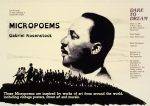 Micropoems - Another wonderful collection of poems for children and young adults by Gabriel Rosenstock. This inspiring set of short and very short poems or “micropoems” are set to beautiful public domain artwork. Sample Pages from Micropoems Download or read online the full book by selecting one of ...
Micropoems - Another wonderful collection of poems for children and young adults by Gabriel Rosenstock. This inspiring set of short and very short poems or “micropoems” are set to beautiful public domain artwork. Sample Pages from Micropoems Download or read online the full book by selecting one of ...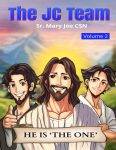 The JC Team Volume 2 – Bible Stories - Another great biblical anthology from Sister Mary Joe. Stories included are Where the Wind Blows; Jesus’ Little Companions; Ask, Seek, Knock; Talents; Mary Remembers; The Fragrance; The Blind Man; Beside Bethsaida; The Crazy Pigs. Author:Sister Mary Joe Sample Text from The JC Team Volume 2 Chapter 1 WHERE THE WIND BLOWS One night, a Pharisee ...
The JC Team Volume 2 – Bible Stories - Another great biblical anthology from Sister Mary Joe. Stories included are Where the Wind Blows; Jesus’ Little Companions; Ask, Seek, Knock; Talents; Mary Remembers; The Fragrance; The Blind Man; Beside Bethsaida; The Crazy Pigs. Author:Sister Mary Joe Sample Text from The JC Team Volume 2 Chapter 1 WHERE THE WIND BLOWS One night, a Pharisee ...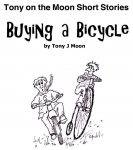 Buying a Bicycle - A short humourous story for older children about buying a bicycle. Waiting in The Shovel and Custard for the next bus makes Joe think there must be a better way to spend our time. But if you ever thought buying a bicycle was a simple matter, you should have come with us. Download the full ...
Buying a Bicycle - A short humourous story for older children about buying a bicycle. Waiting in The Shovel and Custard for the next bus makes Joe think there must be a better way to spend our time. But if you ever thought buying a bicycle was a simple matter, you should have come with us. Download the full ...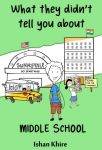 What They Didn’t Tell You About Middle School - Ishan Khire is back with a wonderful treatise on life in middle school. In this book Ishan will have to face the biggest challenge of his life: middle school. Suddenly, from arts and crafts week and eating mac and cheese with juice boxes at lunch, he’s thrust into an environment with 6 foot giants they ...
What They Didn’t Tell You About Middle School - Ishan Khire is back with a wonderful treatise on life in middle school. In this book Ishan will have to face the biggest challenge of his life: middle school. Suddenly, from arts and crafts week and eating mac and cheese with juice boxes at lunch, he’s thrust into an environment with 6 foot giants they ...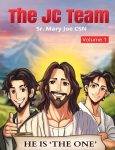 The JC Team Vol 1 – from Sr. Mary Joe - Sister Mary Joe tells bible stories for the modern reader, with a special appeal to Generation Z, “The JC Team” acts as a bridge between ancient scripture and contemporary understanding. The book endeavors to make these narratives relatable, ensuring that readers not only comprehend the stories but also internalize their profound messages. Through its unique ...
The JC Team Vol 1 – from Sr. Mary Joe - Sister Mary Joe tells bible stories for the modern reader, with a special appeal to Generation Z, “The JC Team” acts as a bridge between ancient scripture and contemporary understanding. The book endeavors to make these narratives relatable, ensuring that readers not only comprehend the stories but also internalize their profound messages. Through its unique ...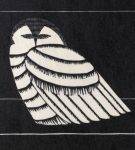 Snowy Owl – Haiku for older children - Gabriel Rosenstock is back with a great collection of inspiring bilingual Haiku set to thought provoking artwork and photographs, including some issues on child labour in the US. Sample Page from Snowy Owl Gabriel Rosenstock See more from Gabriel Rosenstock on FKB For more about Haiku, see here: https://vcbf.ca/event/about-haiku/. It is noted that while Japanese ...
Snowy Owl – Haiku for older children - Gabriel Rosenstock is back with a great collection of inspiring bilingual Haiku set to thought provoking artwork and photographs, including some issues on child labour in the US. Sample Page from Snowy Owl Gabriel Rosenstock See more from Gabriel Rosenstock on FKB For more about Haiku, see here: https://vcbf.ca/event/about-haiku/. It is noted that while Japanese ...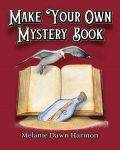 Make Your Own Mystery Book – MYOB Series - Instead of just reading books together at bedtime, aspiring young authors can now make their own book and share it! Spark imagination with the most popular children’s book genres and learn about story structure and creative writing. In this book, Write your Own Mystery Book, there are intriguing prompts of xxx and much more, to ...
Make Your Own Mystery Book – MYOB Series - Instead of just reading books together at bedtime, aspiring young authors can now make their own book and share it! Spark imagination with the most popular children’s book genres and learn about story structure and creative writing. In this book, Write your Own Mystery Book, there are intriguing prompts of xxx and much more, to ...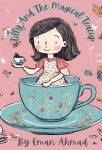 The Whimsical Adventures of Tilly and the Magical Teacup - Once upon a time, in a cozy little cottage at the edge of a bustling town, lived a curious girl named Tilly. Tilly was known throughout the neighborhood for her unruly mop of chestnut hair and a pair of bright, sparkling eyes that held the secrets of a thousand adventures. She was always eager to explore the world around her, but her favorite place of all was her grandmother's attic.
The Whimsical Adventures of Tilly and the Magical Teacup - Once upon a time, in a cozy little cottage at the edge of a bustling town, lived a curious girl named Tilly. Tilly was known throughout the neighborhood for her unruly mop of chestnut hair and a pair of bright, sparkling eyes that held the secrets of a thousand adventures. She was always eager to explore the world around her, but her favorite place of all was her grandmother's attic.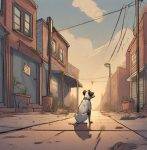 Doggie’s Last Day - A dog’s last day before his owners move home away from the area. Doggie spends his last day saying farewell to his friends and having a final look around the place he’s lived all his life, only to end up with a terrible surprise, and some exciting twists, but will it have a happy ending? ...
Doggie’s Last Day - A dog’s last day before his owners move home away from the area. Doggie spends his last day saying farewell to his friends and having a final look around the place he’s lived all his life, only to end up with a terrible surprise, and some exciting twists, but will it have a happy ending? ...
All our posts are checked by Grammarly, the free online grammar checker (British English used):
This site is hosted by Bluehost:

Leave a comment (it won’t be public) if you want help getting your own website cost-effectively.












Hi freekidsbooks.org admin, Thanks for the valuable information!
👍😊(^_^)
I want to translate from English version to Myanmar. Please reply me whether you agree and give permission or not.
Hi, the book is in CC with no restrictions (CC-BY-SA), so as far as I know you can do this no problems, but if you are in doubt you should get in touch with the publishers and author at Saita, I am sure he will be very flattered.
Hi, the book is in Creative Commons without restrictions (CC-BY-SA), so I believe you can, but if in doubt you should contact the publishers and the author (Saita), I believe he will be very flattered you wish to do this, Danielle (site editor FKB)